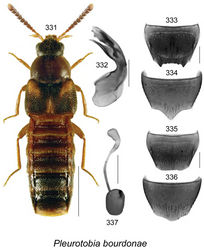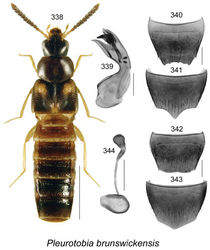Pleurotobia brunswickensis
| Notice: | This page is derived from the original publication listed below, whose author(s) should always be credited. Further contributors may edit and improve the content of this page and, consequently, need to be credited as well (see page history). Any assessment of factual correctness requires a careful review of the original article as well as of subsequent contributions.
If you are uncertain whether your planned contribution is correct or not, we suggest that you use the associated discussion page instead of editing the page directly. This page should be cited as follows (rationale):
Citation formats to copy and paste
BibTeX: @article{Webster2016ZooKeys, RIS/ Endnote: TY - JOUR Wikipedia/ Citizendium: <ref name="Webster2016ZooKeys">{{Citation See also the citation download page at the journal. |
Ordo: Coleoptera
Familia: Staphylinidae
Genus: Pleurotobia
Name
Pleurotobia brunswickensis Klimaszewski & Webster sp. n. – Wikispecies link – ZooBank link – Pensoft Profile
Holotype (male)
Canada, New Brunswick, York Co., Canterbury near Browns Mtn. Fen, 45.8876°N, 67.6560°W, 3.VIII.2006, R.P. Webster, coll. // Hardwood forest, on slightly dried Pleurotus sp. on sugar maple (LFC). Paratype: Canada, New Brunswick, Sunbury Co., Maugerville, Portobello Creek N.W.A., 45.8992°N, 66.4245°W, 18.VII.2004, R.P. Webster, coll. // Silver maple forest, on fleshy fungi (1 ♀, RWC).
Etymology
This species name derives from the Canadian province of New Brunswick where the types were found.
Description
Body length 3.9–4.0 mm, narrowly oval, robust, head, pronotum, most of elytra and posterior part of abdomen brownish black, elytra with a yellowish area or spot extending obliquely from each shoulder and a short, narrow longitudinal spot along suture apically, base of abdomen, legs, two basal antennal articles and maxillary palps yellowish (Fig. 338); integument strongly glossy, densely and coarsely punctate, especially on elytra and in tergal impressions; head much narrower than pronotum, eyes large, longer than temples, antennae with articles V–X increasingly broadening toward apex; pronotum sinuate basally and rounded laterally, broadest at middle and then abruptly narrowed apicad; elytra with prominent shoulders, broader than pronotum; abdomen subparallel, three basal tergites with deep impressions, each coarsely punctate. Male. Median lobe of aedeagus with bulbus moderately large, oval, tubus long, strongly produced ventrally, its ventral margin strongly sinuate, subapical section wide and apex thin, narrow and acutely pointed ventrally in lateral view (Fig. 339); apical margin of tergite VIII broadly, shallowly emarginate between two large lateral teeth, emargination weakly crenulate (Fig. 340); sternite VIII strongly, triangularly produced apically (Fig. 341). Female. Tergite VIII slightly sinuate apically (Fig. 342); sternite VIII obtusely produced apically, apex subangulate (Fig. 343) spermatheca with capsule short, widely club shaped, stem narrow, curved (Fig. 344).
This species is externally similar to Pleurotobia bourdonae, but has a narrower, less coarsely punctate and glossier body, and yellowish body color, the apical teeth of male tergite VIII are less prominent, and the median lobe of the aedeagus is differently shaped, with the venter strongly sinuate in lateral view (Figs 332, 339).
Distribution
Known only from NB, Canada.
Natural history
The holotype was found in a slightly dried Pleurotus mushroom on a sugar maple in an old hardwood forest in early August, the paratype was found in a fleshy fungus in a silver maple forest in July.
Comments
See the previous species.
Original Description
- Webster, R; Klimaszewski, J; Bourdon, C; Sweeney, J; Hughes, C; Labrecque, M; 2016: Further contributions to the Aleocharinae (Coleoptera, Staphylinidae) fauna of New Brunswick and Canada including descriptions of 27 new species ZooKeys, (573): 85-216. doi
Images
|

